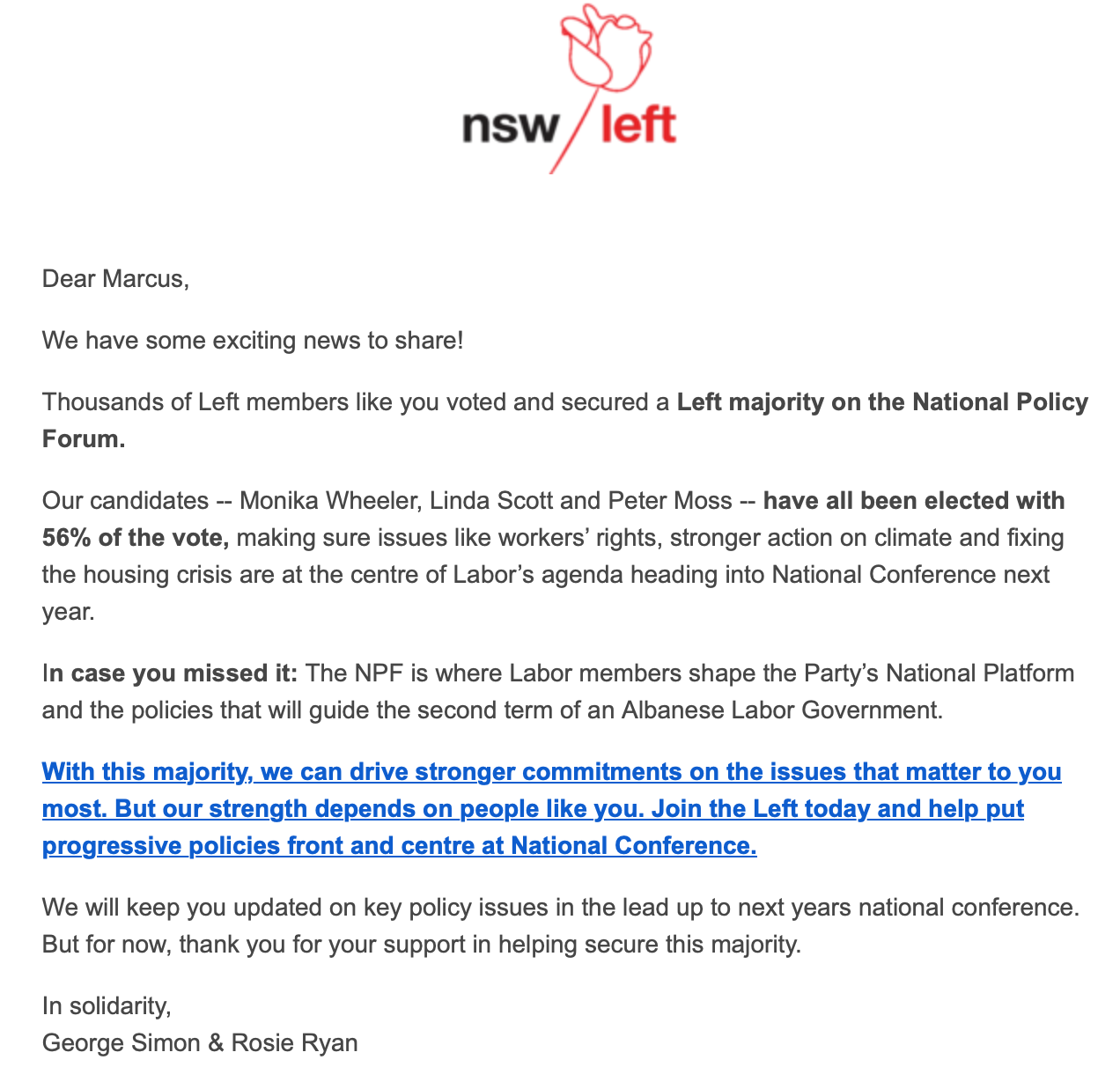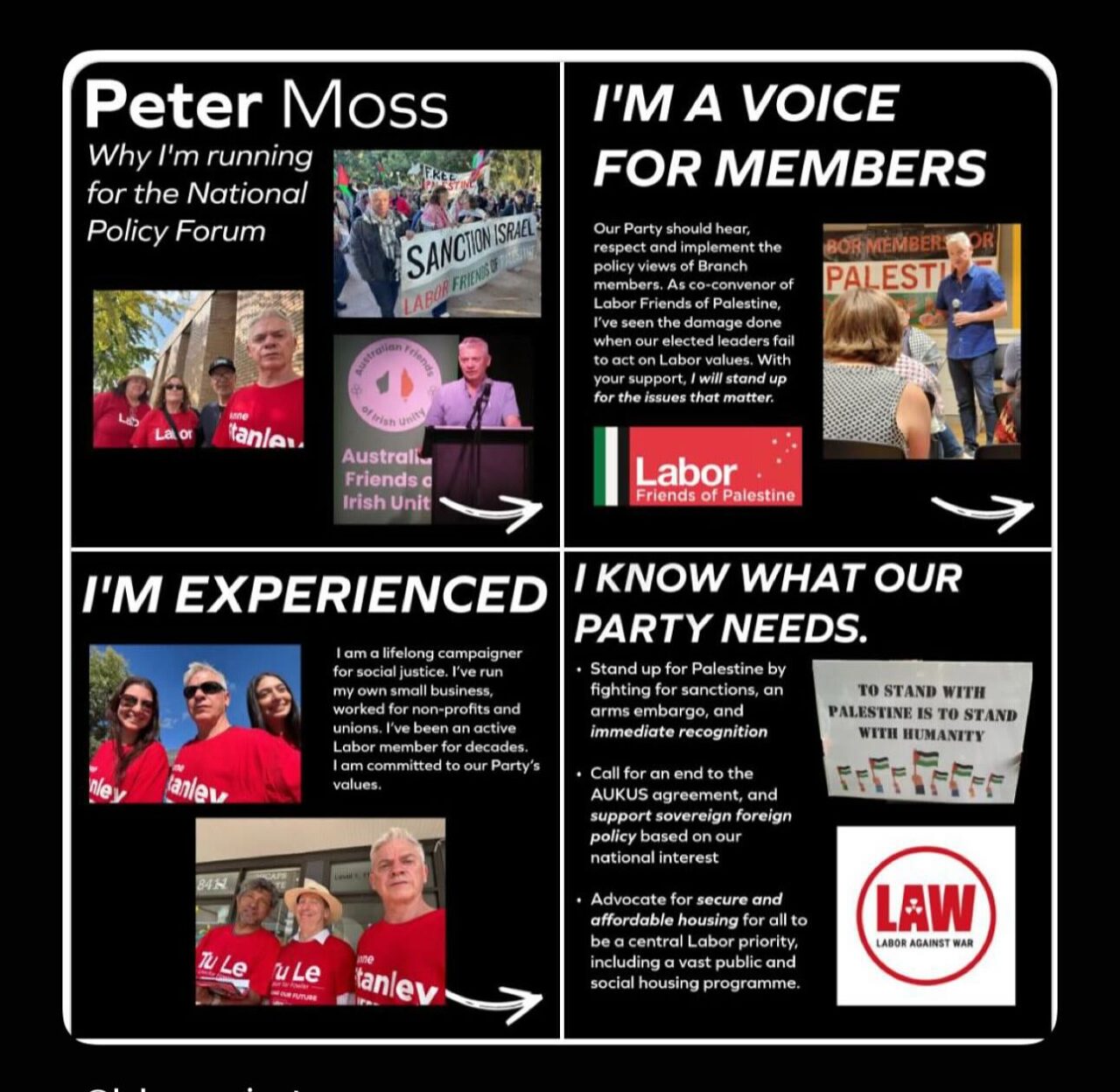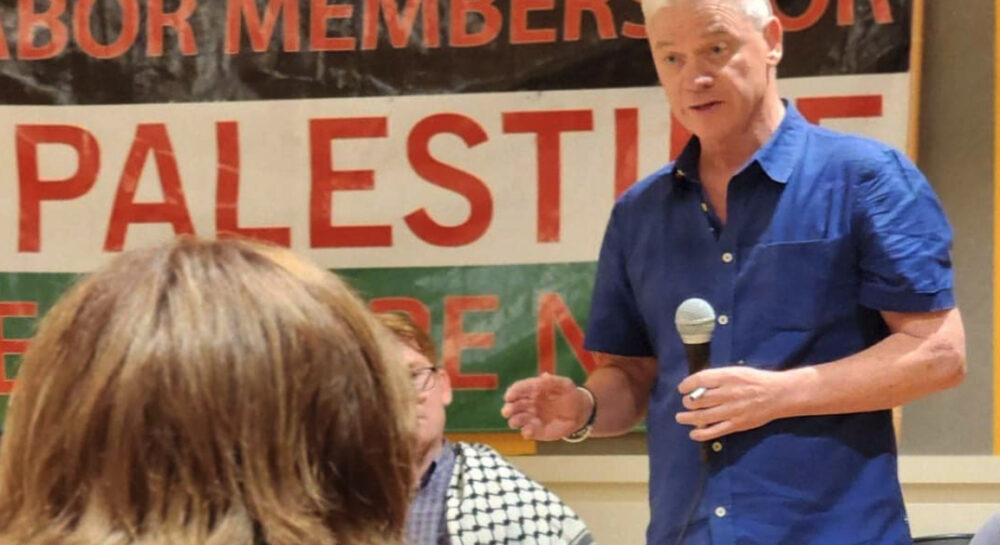Peter Moss will be an experienced and committed voice for Palestine and against AUKUS on the National Policy Forum. But the vote also reveals the murky nature of the ALP’s factional system, writes Marcus Strom.
The election of Peter Moss to the ALP National Policy Forum is a victory worth celebrating for socialists in the Labor Party and the broader labour movement. Running on a platform of solidarity with Palestine, for sanctions against Israel, opposition to the AUKUS nuclear submarine pact and a commitment to housing for all, Moss showed that principled politics can cut through the suffocating factionalism of the Labor Party.
Backed by Labor Friends of Palestine and Labor Against War, Moss’s election as one of five NSW delegates to the 65-strong National Policy Forum can open space to fight for socialist politics and democratic transformation of the ALP. The NPF is chaired by the Prime Minister, Anthony Albanese, and recommends policy to the tri-annual national conference.
We must also be clear-eyed. The National Policy Forum is a balancing act of factional machinery. Moss was backed by the NSW “Soft Left” subfaction on a joint ticket with the Albanese ‘Left’ – the same faction that defends AUKUS and refuses to sanction Israel. We understand that some Albanese Left MPs even refused to promote Moss during the ballot and, after the result, the NSW Left’s email failed to mention his stance on Palestine or AUKUS. This silence is not an accident; it is an erasure.
The NSW Left email said: “Our candidates – Monika Wheeler, Linda Scott and Peter Moss – have all been elected with 56% of the vote, making sure issues like workers’ rights, stronger action on climate and fixing the housing crisis are at the centre of Labor’s agenda heading into National Conference next year.”
Complete censorship of the platform that Peter Moss stood on, which clearly said he “won’t just be a rubber stamp for the existing Party agenda”.
For NSW Left faction chiefs George Simon and Rosie Ryan to claim him as part of their mandate obscures the real and principled differences between Moss’s campaign on one hand and the institutional Albanese ‘Left’ on the other.
Unfortunately, this is the price of the Faustian bargain of standing on a joint ticket with people who oppose your core campaign policies.

Full results leaked to Labor Tribune
The factional system thrives on exactly this kind of double-speak and denial. It locks members out, hides the truth and dilutes principle in the name of unity. The final results of the ballot were not even communicated to members, but they have been leaked to Labor Tribune.
While entwined with the Albanese Left ticket, Moss’s campaign nonetheless does highlight that a different path is possible. Winning 776 votes, it shows that hundreds inside the NSW branch are willing to support a candidate who stand for Palestine and against AUKUS militarism.
That base can grow but only if it is not shackled to the factional system. The Soft Left cannot continue to march alongside the Albanese Left, pretending unity, while the latter backs nuclear submarines, the US war drive against China and gives diplomatic cover to genocide in Gaza.
To be charitable, at least the NSW Left reported (part of) the election result. From NSW ALP head office, nothing.
Party democracy is treated as the private property of MPs and factional leaders.
However, Labor Tribune can report the full results of the vote in NSW.
| Candidate | Faction | Votes | notes |
|---|---|---|---|
| Monika Wheeler | Albanese ‘Left’ | 1043 | elected 1st |
| Bilal el-Hayek | Right | 892 | elected 2nd |
| Linda Scott | Albanese ‘Left’ | 778 | elected 3rd |
| Peter Moss | Soft Left | 776 | elected 4th |
| Caitlin Marlor | Right | 476 | no quota but elected 5th |
| TOTAL | VOTES | 4548 | only elected candidates included |
Moss claimed an election quota to the National Policy Forum in his own right. This shows two things: first, the institutionalised factions still dominate internal votes; second, there is a growing audience for democratic and nascent anti-imperialist politics in the ALP that can be built upon in coordination with the left across the labour movement.
Peter Moss’s campaign material was clear on Palestine, on AUKUS and on housing. He has been a fantastic campaigner for Labor Friends of Palestine; he was a founding member of Labor Against War. And he was clear on the need for more democracy. What his campaign was silent on was the fact it was supported by the ‘Soft Left’, also called the ‘Fergs’ – for historical reasons I won’t go into now.
While standing on supportable positions, the Soft Left is still part of the compromised ALP factional machine that has more to do with divvying up power and jobs than clarity on principled politics.
The ‘Soft Left’ needs to break politically and organisationally with the Albanese Left, not stand on joint tickets. And it should develop an independent political program that it publicly campaigns for.
Peter Moss’s election is of great benefit to those campaigning against AUKUS, for Palestine and for sanctions on Israel. But the method of his election also serves as a reminder that until we break the stranglehold of opaque factional deals, the will of the membership will continue to be filtered, diluted and often discarded.
For Labor to be turned into an open and democratic party of the working class, it must be forced to embrace transparent, democratic debate, not smother it with managerial factional fixes.
The lesson of this election is clear: principled politics can win. We need a socialist Labor left that is willing to say “no” to AUKUS, “no” to militarism, and “yes” to justice for Palestine openly and independently.
Peter Moss’s election is a welcome crack in the wall of the factional machine. Now it is up to the rank and file to widen that crack into a break.


